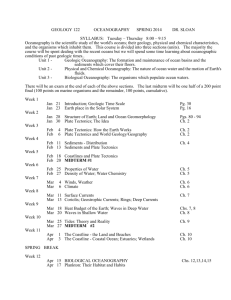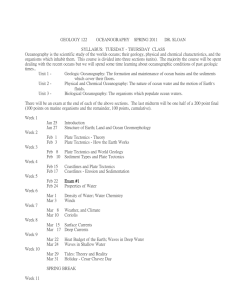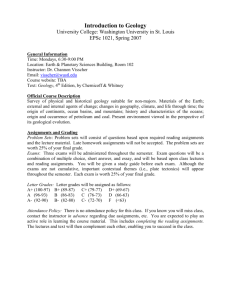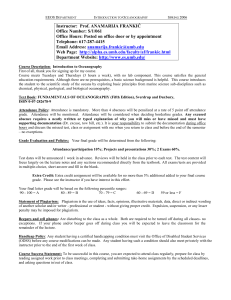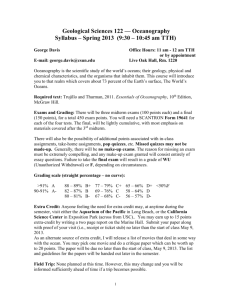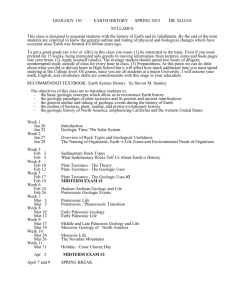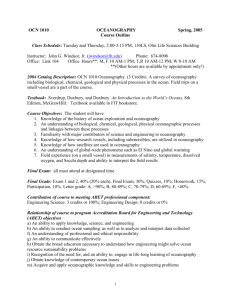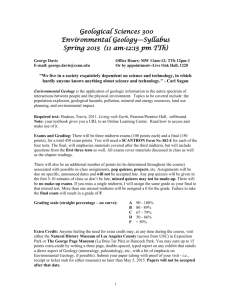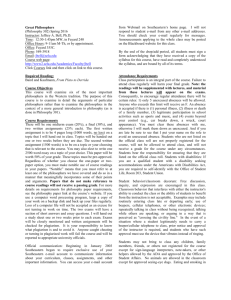FT Sloan Geol 122 TTH
advertisement
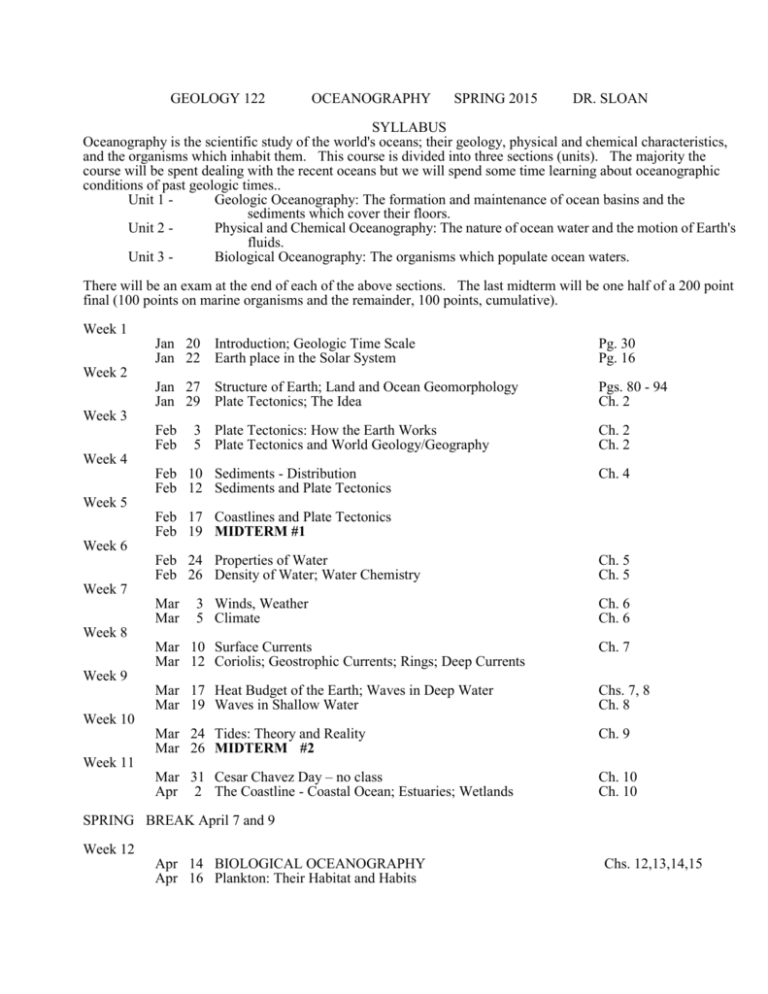
GEOLOGY 122 OCEANOGRAPHY SPRING 2015 DR. SLOAN SYLLABUS Oceanography is the scientific study of the world's oceans; their geology, physical and chemical characteristics, and the organisms which inhabit them. This course is divided into three sections (units). The majority the course will be spent dealing with the recent oceans but we will spend some time learning about oceanographic conditions of past geologic times.. Unit 1 Geologic Oceanography: The formation and maintenance of ocean basins and the sediments which cover their floors. Unit 2 Physical and Chemical Oceanography: The nature of ocean water and the motion of Earth's fluids. Unit 3 Biological Oceanography: The organisms which populate ocean waters. There will be an exam at the end of each of the above sections. The last midterm will be one half of a 200 point final (100 points on marine organisms and the remainder, 100 points, cumulative). Week 1 Jan 20 Introduction; Geologic Time Scale Jan 22 Earth place in the Solar System Pg. 30 Pg. 16 Jan 27 Structure of Earth; Land and Ocean Geomorphology Jan 29 Plate Tectonics; The Idea Pgs. 80 - 94 Ch. 2 Feb Feb Ch. 2 Ch. 2 Week 2 Week 3 3 Plate Tectonics: How the Earth Works 5 Plate Tectonics and World Geology/Geography Week 4 Feb 10 Sediments - Distribution Feb 12 Sediments and Plate Tectonics Ch. 4 Week 5 Feb 17 Coastlines and Plate Tectonics Feb 19 MIDTERM #1 Week 6 Feb 24 Properties of Water Feb 26 Density of Water; Water Chemistry Ch. 5 Ch. 5 Mar Mar Ch. 6 Ch. 6 Week 7 3 Winds, Weather 5 Climate Week 8 Mar 10 Surface Currents Mar 12 Coriolis; Geostrophic Currents; Rings; Deep Currents Ch. 7 Mar 17 Heat Budget of the Earth; Waves in Deep Water Mar 19 Waves in Shallow Water Chs. 7, 8 Ch. 8 Mar 24 Tides: Theory and Reality Mar 26 MIDTERM #2 Ch. 9 Mar 31 Cesar Chavez Day – no class Apr 2 The Coastline - Coastal Ocean; Estuaries; Wetlands Ch. 10 Ch. 10 Week 9 Week 10 Week 11 SPRING BREAK April 7 and 9 Week 12 Apr 14 BIOLOGICAL OCEANOGRAPHY Apr 16 Plankton: Their Habitat and Habits Chs. 12,13,14,15 Week 13 Apr 21 Ocean Environments; Primary Production Apr 23 Food Chains; Trophic Levels and Energy Cycling Week 14 Apr 28 Natural Ecological Perturbations Apr 30 Human Caused Ecological Perturbations Ch. 16 Week 15 May May FINAL EXAM: 5 The Future of the Oceans; vibrant or stagnant? 7 REVIEW Thursday May 14 8:00 – 10:00 - Essentials of Oceanography 11th edition Trujillo and Thurman; if you can find an older editions it will be fine to use, although the page numbers will be different. EXAMS: - Two Midterms; 100 Points Each; Multiple Choice - Final; 200 Points; Half on the Final Third of the Course and Half Cumulative - No Make-up Exams Will Be Given OFFICE HOURS: Tuesday/Thursday 7:00 – 7:50 AM or by appointment OFFICE: - Live Oak Hall; Room 1225 EMAIL: - jon.sloan@csun.edu TEXTBOOK: GRADING: 400 Points Possible. A 85% - 100% B 75% - 84% C 60% - 74% D 50% - 59% F below 50% Plus and minus grades will be given in borderline cases. These will be determined in the following ways: - Improvement during the course of the semester - Attendance and class participation DROPS: Unless you are withdrawing from all your classes and the University, no student will be allowed to withdraw from this class after the third week. This is University policy, not mine. WARNINGS: It is very simple; students who come to class with both body and brain get good grades, those who don't, don't. Make every attempt to get to class on time. Unforeseen problems do come up. If you arrive late for class please be considerate and enter and take a seat with as little disruption as possible. A grade of Incomplete (I) is not given in this class. NO TOYS ARE TO BE TURNED ON IN CLASS: NO PHONES, NO IPODS, NO TEXTING, NO TWITTERING, ETC. DURING CLASS TIME. YOUR TOY MAY BE CONFISCATED AND TURNED INTO THE SCHOOL DEANS OFFICE. It is the responsibility of each student to know and follow all the written guidance given by the instructor in this syllabus.
